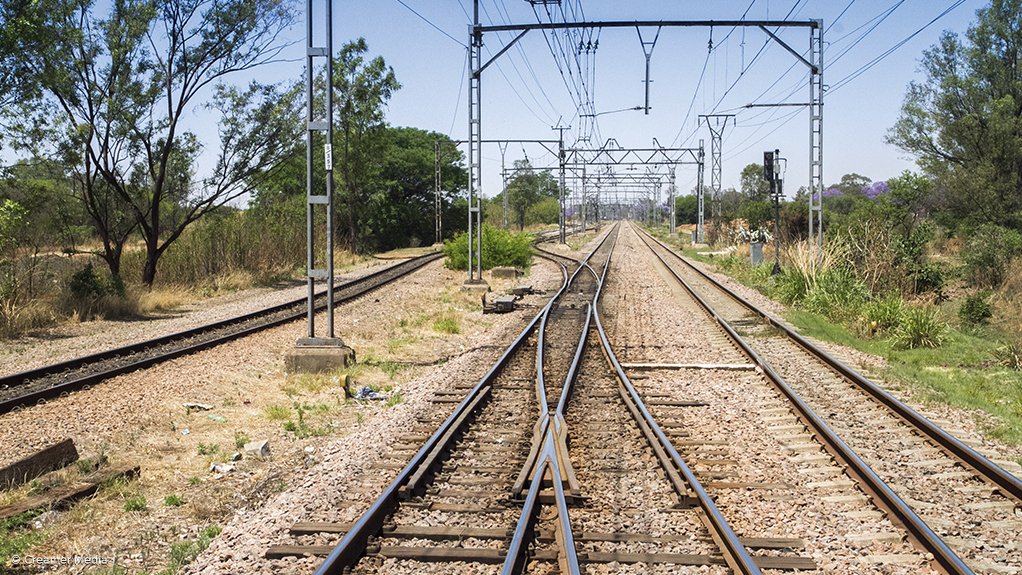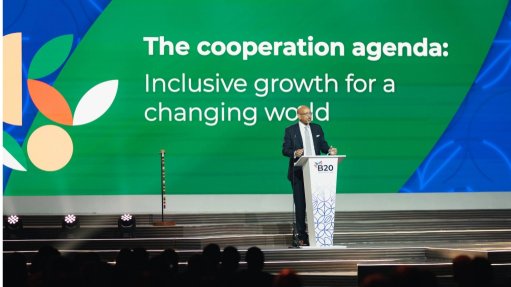Govt targets August next year, or sooner, for third-party rail access
The current target date for enabling third-party operators in the rail-freight sector is August next year, says Dr Sean Phillips, head of National Treasury’s Operation Vulindlela unit.
There are, however, ongoing efforts under way to speed up the time frame put on the table by Transnet, he adds.
He says Transnet has indicated that its subsidiary Transnet Freight Rail (TFR) will separate its accounts into rail infrastructure and operations in September this year, leading to commercial separation by August next year, “which would enable accurate costing for third-party operators”.
Phillips adds, however, that Operation Vulindlela “would hope that it might be possible for the timeframe put on the table by Transnet to be accelerated”.
Operation Vulindlela, a joint undertaking between the Presidency and Treasury, is tasked with accelerating structural reforms in the domestic economy.
“Government is moving in a direction of enabling more private-sector participation in sectors like ports and freight rail, with the aim of increasing competition. This will result in a more competitive freight transport environment, and more reliable and better-quality freight transport services,” explains Phillips.
This process includes finalising the White Paper on National Rail Policy, establishing a single transport economic regulator, and allowing third-party access to South Africa’s rail system.
Phillips emphasises, however, that it is not necessary to wait for the establishment of the regulator, or the finalisation of the national rail policy to allow third-party access.
He says container freight on rail “has halved in the last ten years” and moved to road.
“The main reason for that is not that road is cheaper, or rail too expensive, but that the service provided by TFR is not reliable.”
The move towards third-party access follows the announcement on structural reforms by President Cyril Ramaphosa last October that private rail operators will be allowed to operate on South Africa’s core rail network (called third-party access) to supplement Transnet’s capacity and assist in migrating freight volumes from road to rail, as well as to stimulate economic growth.
Economic Boost
African Rail Industry Association (Aria) CEO Mesela Nhlapo says the opening of South Africa’s rail infrastructure to third-party operators will provide a multibillion-rand boost to the country’s economy over the next five years, “potentially creating thousands of jobs and driving massive economic benefits”.
At the same time, State-owned rail operator Transnet will derive a material new income stream through access fees, without having to go into competition with private rail operators, she adds.
Aria represents companies that are original equipment manufacturers, rail operators, or rail services companies in the rail sector and associated industries. It is also a fully-fledged export council supported by the Department of Trade, Industry and Competition.
“The table is set for the practical implementation of third-party access,” notes Nhlapo.
“No new regulation or legislation is required for implementation.
“South Africa’s unutilised track network capacity is vast, and there is a body of around 58-million tons of freight a year that will move to rail when rail capacity grows, benefiting sectors like agricultural commodities, metals and minerals, cars, containers, hazardous chemicals and liquid bulk.”
Early projections by Aria suggest that additional parties using the rail network will create tens of thousands of upstream jobs by enabling industry (such as smelters, steel mills, manufacturing and agri-processing) and mining (new coal, manganese and iron-ore mines, among others) to become internationally competitive.
Similarly, rail corridors into Africa could create cost-effective gateways to take South African goods to these markets.
Nhlapo adds that there is no privatisation involved in creating third-party access.
“There is no sales transaction here, no selling of State assets. We are asking for access, that’s it.”
Investment Boon
James Holley, the CEO of independent rail operator Traxtion, echoes Nhlapo’s sentiment, noting that opening the rail network to third-party operators will unlock billions of rands in industry investments “almost immediately”.
Investment in new trains is anticipated to be in the region of R45-billion, the majority of which will be manufactured in South Africa.
Traxtion has already announced an initial locomotive and wagon build programme of R1.5-billion, with plans to invest a further R14-billion to R17-billion in locomotives and wagons over the next five years as part of a scaled rolling stock procurement programme.
Holley adds that he believes there is sufficient capacity in the rail network for third-party operators.
South Africa has a rail network similar to that of Germany, with 85% of Africa’s rail track sitting in South Africa.
While Transnet makes excellent use of the two iron-ore and coal export lines (at 60% of total rail freight volume), the same is not true for the general freight network (at 40%), explains Holley.
From 1974, there has been a significant reduction in the tonnage moved on the general freight network, he adds.
“The fact that we moved significantly more volume on that network in 1974 tells us anecdotally that there is significant capacity on the network.”
He says a study of the network has also shown that the general freight network is less than 30% utilised.
“This means the lines to Port Elizabeth, East London, Cape Town, Botswana, Namibia, the North-South corridor and across to the Maputo corridor are all less than 30% utilised.
“This massive network is a big burden to Transnet.”
Holley adds that Traxtion believes that there will be no requirement for any investment from Transnet or the fiscus to prepare for private trains to enter the network.
He also notes that the addition of new private rail players to the system will allow the rail manufacturing sector to secure a steady, more predictable stream of work, instead of the current situation of famine or feast with work flowing only from State-owned companies.
Not Only SA Operators
Should third-party access only be open to South African operators?
Holley believes this should not be the case, as such a situation will not enable seamless operations for a single train from South Africa into its neighbouring countries.
“South Africa wants to position itself as the manufacturing hub for Africa. If we want to do that, we need efficient trade routes, so it doesn’t make sense to use only South African operators.”
* Philips, Nhlapo and Holley spoke during a webinar hosted by the African Rail Industry Association.
Article Enquiry
Email Article
Save Article
Feedback
To advertise email advertising@creamermedia.co.za or click here
Comments
Press Office
Announcements
What's On
Subscribe to improve your user experience...
Option 1 (equivalent of R125 a month):
Receive a weekly copy of Creamer Media's Engineering News & Mining Weekly magazine
(print copy for those in South Africa and e-magazine for those outside of South Africa)
Receive daily email newsletters
Access to full search results
Access archive of magazine back copies
Access to Projects in Progress
Access to ONE Research Report of your choice in PDF format
Option 2 (equivalent of R375 a month):
All benefits from Option 1
PLUS
Access to Creamer Media's Research Channel Africa for ALL Research Reports, in PDF format, on various industrial and mining sectors
including Electricity; Water; Energy Transition; Hydrogen; Roads, Rail and Ports; Coal; Gold; Platinum; Battery Metals; etc.
Already a subscriber?
Forgotten your password?
Receive weekly copy of Creamer Media's Engineering News & Mining Weekly magazine (print copy for those in South Africa and e-magazine for those outside of South Africa)
➕
Recieve daily email newsletters
➕
Access to full search results
➕
Access archive of magazine back copies
➕
Access to Projects in Progress
➕
Access to ONE Research Report of your choice in PDF format
RESEARCH CHANNEL AFRICA
R4500 (equivalent of R375 a month)
SUBSCRIBEAll benefits from Option 1
➕
Access to Creamer Media's Research Channel Africa for ALL Research Reports on various industrial and mining sectors, in PDF format, including on:
Electricity
➕
Water
➕
Energy Transition
➕
Hydrogen
➕
Roads, Rail and Ports
➕
Coal
➕
Gold
➕
Platinum
➕
Battery Metals
➕
etc.
Receive all benefits from Option 1 or Option 2 delivered to numerous people at your company
➕
Multiple User names and Passwords for simultaneous log-ins
➕
Intranet integration access to all in your organisation




















